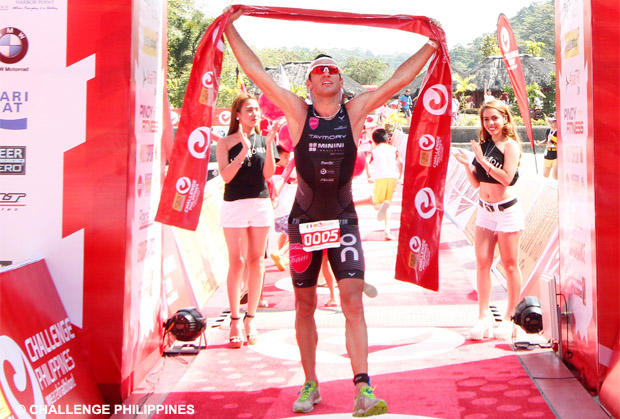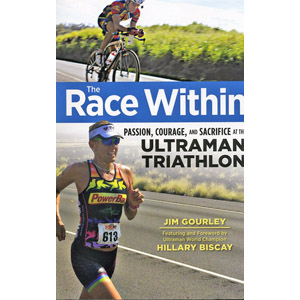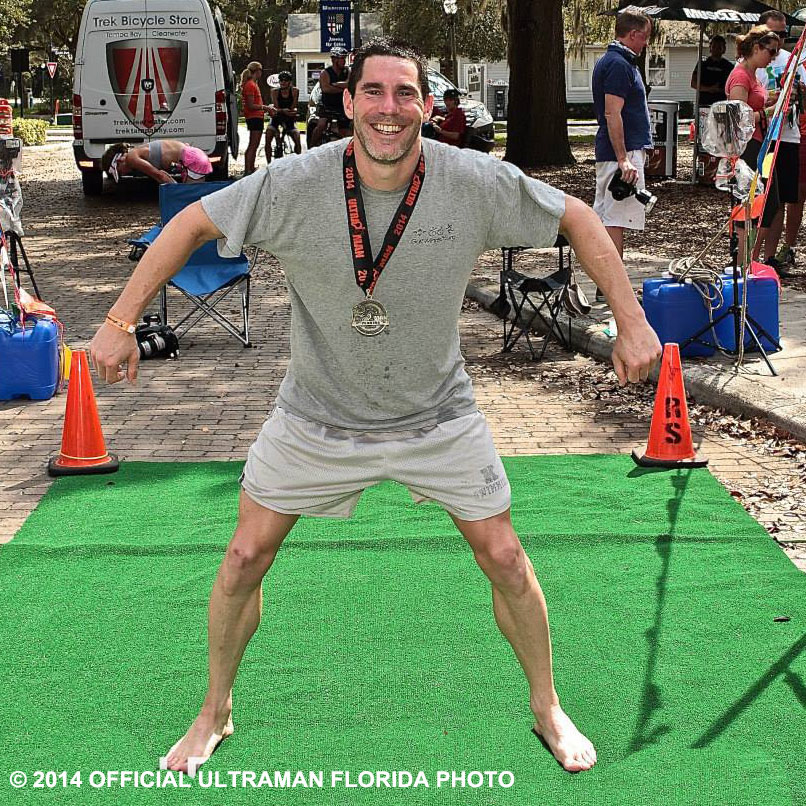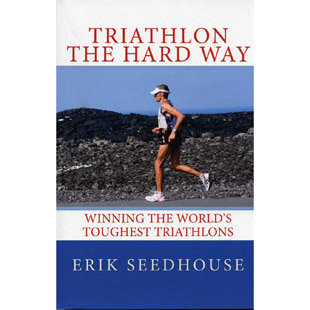Billy the Kid talks Ultraman
Billy Edwards had little time for training over the winter for his rookie baptism at the Ultraman distances – a 10 kilometer swim, 90 mile bike leg, 171-mile bike leg and the 52.4 mile run he would face over 3 days at Ultraman Florida. When the race was over, he won in a time of 23:17:02, well off the race record set a year ago by Chuck Kemeny. While he didn’t have an ideal number of training miles in the bank, he did have one very nice trump card on his 3-person crew – 2008 Ironman 70.3 World Champion Joanna Zeiger – who offers her perspective on her experience at the end of Edwards’ Q&A.
Slowtwitch: Are you still sore?
Billy Edwards: Thanks, no, not really, my body is coming around pretty quickly.
ST: Why not?
Billy: Due to the timing of this race and the primary goal of experiencing the distance and getting an invitation to race Ultraman Hawaii, I shut it down a couple times in hopes of living to fight another day. I even did some walking on the run Sunday.
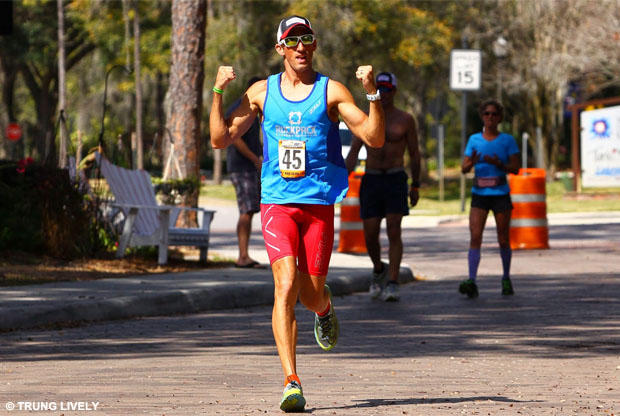
BACKGROUND
ST: You went to the Naval Academy – what sports did you play there and how good were you?
Billy: After a bland high school running career I had no delusions of grandeur. I just wanted to be the best I could be competing for a Division I team. I ran for 11 out of the 12 seasons there under Coach Al Cantello. He was a complete horse's ass but I loved every moment running under his tutelage. I was always given the chance to race, and I got faster, but I was affectionately known as a Dr. Workout. I never really competed well, but I logged some epic workouts. I learned a lot about myself and the sport with Al – a great coach who got more out of me than anyone else ever has. My specialty was middle distance – I ran 4:15 for the mile and 2:31 for the 1000m. When I quit the team my senior year, I road raced for cash and was low 31 minutes for 10k.
ST: Why did you choose to serve as a Marine?
Billy: While at the United States Naval Academy, I learned I did not like flying, did not like being on ships and I wanted to do something. The Marines were always doing something, so I chose the Marines – I loved the discipline and esprit de corps. And Coach Cantello was a Marine!
ST: Tell us about your service.
Billy: I was a Marine Infantry Officer who was training in the field on 9-11. I ended up leading a platoon during the invasion of Iraq in March of 2003. We had an easy fight in 2003 relative to what my battalion endured later in Fallujah. I was shot at and we shot back, but what I did was neither heroic, nor as dangerous as many others. I returned with all my limbs and all my Marines in 2003, but later I lost friends who formerly served under me.
ST: What led you to triathlon?
Billy: I was a huge fan of Mark Allen growing up. I had a neon Nike hat and neon Nike running shorts like Mark and I always wanted to go to Kona. Now I swim in Dave Scott's group and consider him a good friend. I got a bike while at the USNA and actually did some tris in southern California in 2001. I was a pretty good duathlete and went to Holland for Long Distance Du Worlds in 2001 and did really well. At that time, I lived in San Clemente and would drive down south on Saturday for the Swamis ride and then back down south to run at San Dieguito Park on Sunday. But as an operational infantry Marine there was no time for a serious involvement in triathlon. I finally got into triathlon regularly while back in Virginia Beach (non-operational Marine time = time to train). In 2005, I did my first Ironman and finished in 19th place, 3rd amateur, in 9:27.
ST: What were your dreams when you started triathlon and how close did you come?
Billy: I dreamt that I could maybe make top 10 in Kona or win a domestic Ironman. But I never could figure out the swim – still have not. I turned pro in 2006 after some really good amateur performances and I trained under Scott Molina and Dr. Phil Skiba – who both taught me a bunch. I went to Kona twice as an amateur and twice as a pro. I never broke nine hours but never went over 10. Molina told me that after 2008 Ironman racing was going to change for good, and I had about 2 years to figure out the swim. After that, the ITU racers would make it impossible to be great if you had any weakness. Molina was spot-on and that is why I went back to racing as an amateur in 2014.
ST: What led you to become the US Naval Academy Triathlon coach?
Billy: In 2007, I had pancakes at Du Worlds with the soon-to-be USNA Team Captain Derek Oskutis. He knew he had a potentially solid team but he needed a coach to get them all on the same page. Derek and I took a team whose core was brand new to triathlon and they won the USA Triathlon Collegiate National Team Championship in 2009. I coach the team from Boulder via TrainingPeaks software and visit twice a semester. I take the time to get to know my athletes beyond swim/bike/run and I understand the Academy and work around their ever-changing schedule. I have taken my ever-growing knowledge and ability to coach to keep our team extremely competitive against many schools with grad students and pros.
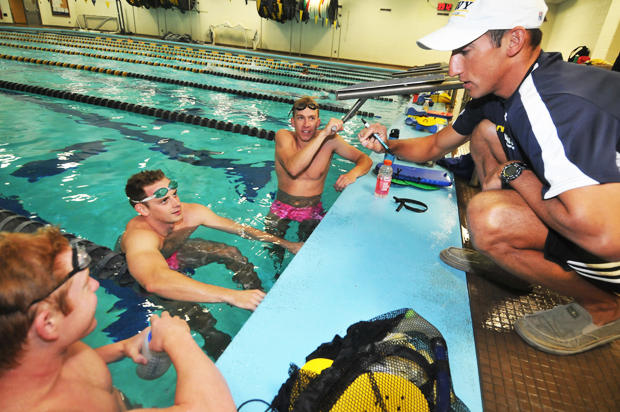
ULTRAMAN
ST: What led you to Ultraman?
Billy: I read articles about Ultraman Hawaii and I also trained under Scott Molina and alongside Gordo Byrn – both Ultraman World Champs. As I never found Ironman terribly difficult with regards to length, Ultraman always seemed like the next step.
ST: What attracted you?
Billy: Purity of sport. It was just like the original Ironman only longer; and it started IN Hawaii as a circumnavigation of the Big Island. Plus Ultraman is nearly void of the bullshit that pervades much of the current more popular formats.
ST: Did you have some idea that you might be more suited to ultra long events?
Billy: Once I got lost on a metric century ride in the mountains of Virginia. I went over a mountain pass and into the state of West Virginia. I rode 156 miles by accident and the feeling was amazing.
ST: Which discipline required the most training to adapt?
Billy: It was a tie between the swim and the run. Both were personal bests for length on the day, but I did some pretty long sessions between December and January that allowed me to have some confidence.
ST: Did anyone try to talk you out of this crazy idea?
Billy: Nope. I have proved over the years to my family, friends, and training buddies that if the day is long, I am strong.
ST: Why did you pick Ultraman Florida?
Billy: I knew I could go to the February race, have a good experience, add it to my résumé and hopefully earn an invite to Ultraman Hawaii. Also, I trained a lot in Clermont so I knew the area and thought the course could be fun.
ST: With your demanding private and Annapolis coaching duties, how much training were you able to do?
Billy: I brought on about a half dozen new athletes to coach this winter and, along with the Navy team and being the primary care-giver of our two kids, training for Ultraman was the last item on my to-do list. I got in some long rides on the trainer and took a trip to southern California where I won a 50k trail race in the morning and pushed my kids in a double-bob stroller for a Santa Run through Christmas lights at night putting in another 8 cruisey miles.
ST: How did your long races last year prepare you for Ultraman?
Billy: I was 22nd at Ironman Coeur d’Alene and 8th at Ironman Boulder. Frankly my training was laughable compared to what I had done as a pro. But those races gave me confidence that I can do a lot thanks to my huge base.
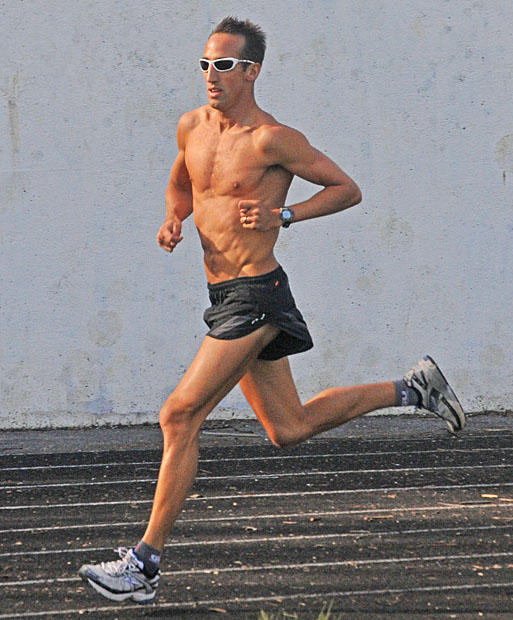
ST: What was your preparation like?
Billy: I treated it like three separate disciplines. I rarely did two sports in a day and I dialed back my pacing for most sessions. My pace in the pool was really picking up this winter so I totally backed it off in December. I also backed off my long run paces and even did a lot more steady state cycling – which I really don’t care for. There was also a ton of logistics (crew, travel, lodging) to organize.
ST: Did you have anxiety about the distances?
Billy: The only thing to fear is the unknown – a 10k open water swim and a double marathon on the road. Yup there was anxiety.
ST: What was your ace in the hole – swim bike or run?
Billy: The bike is my ace when it comes to the long stuff. One hundred and seventy miles is barely a long day. I did Paris-Brest-Paris (1200km) in 48 hours and 46 minutes in 2011 and I won the Furnace Creek 508 (shortened to 353 miles) in 2013. I also did RAAM twice as part of an 8-man team – lots of speed over 5 straight days with little rest. A fun training thing I do is ride from Boulder to Steamboat Springs and return the next day – 300km and over 12,000 feet of climbing.
ST: What is different preparing for a race of this magnitude?
Billy: The easy answer is there is just more of each. It’s longer so you need more and better planning. There are no aid stations and bike issues are not game changers, they are game enders. You and your crew have to be ready for anything. When I was in the taper, I was finally having the time to put together the final details – a bit stressful for myself and my crew.
ST: Tell us about them.
Billy: My race would not have been a success without my crew – Mark Van Akkeren (Marky V), Dr. Derek Russell (Dr. D), and Joanna Zeiger (JZ). Mark was to be the navigator, bike pacing guru, and part mechanic, plus doing the social media stuff. He ended up being sidelined and literally left on the side of the road due to stomach flu. Derek Russell, a good friend from Virginia Beach, is a former beach life guard and a chiropractor and a solid local triathlete. He was my paddler for the 10k swim – required by the race – and he ended up being our driver. He was putting our mini-van in great positions for hand-offs and keeping me motivated on the course with his big thumb-ups hanging out the window. Dr. D put his magic hands to work for both myself and JZ and kept us healthy and balanced all weekend. JZ was my nutrition guru, run pacing specialist, and crew chief.
ST: I understand you train regularly with Joanna.
Billy: JZ and I became good friends through my wife Lara when I first got to Boulder. Eventually we shared a coach – Dr. Phil Skiba – for both of our more successful long course years. We were at our best doing sessions where we did everything but the actual running and biking intervals together. Now we bounce ideas off each other. Even at Ironman Boulder when I literally exploded vomiting on the run, she put me back on track. I even had the privilege of pacing her to a failed attempt at an Olympic marathon trials qualifier – she won the race but just missed the time. With long stuff, I can do a lot of her key sessions and pace her and get a really good workout myself. Plus, she and her husband Mark are great friends and aunty and uncle to our kids.
ST: Why do you think she agreed to be your support crew?
Billy: She knows me and knew that I could really mess this up if I did not do it the right way. I think she wanted to help with the success or be there on the spot to discipline me if I was screwing up.
ST: What was your toughest moment?
Billy: Around 140 miles into the Day 2 bike. JZ and I just did not account for the energy deficit I had on Day 1. So she let me slow down taking in nutrition and I bonked hard for about an hour. I was nearly falling off my bike, but once the calories were replenished I tore up the final 15 miles. The swim was a whole different story.
ST: I hear you came out of the water shivering and at loose ends.
Billy: I had a terrible swim and made some survival decisions that likely decreased my ability to swim (I wore swim socks and a neoprene cap – both for the first time). The air temp was 37 F and the water temp was supposedly 62 F. When I came out and saw 3:20, I was upset and along with the cold grogginess could not properly change into my bike clothes. At that time, I used some poor language that won’t surprise my training buddies. While most of it was directed at myself, these frustrations could have been seen as being a poor sport. I am just über competitive and thought I’d thrown away any chance of winning in the first 3 hours. [Edwards finished in 23:17:02, 1:38:30 behind the time of 2014 winner Chuck Kemeny].
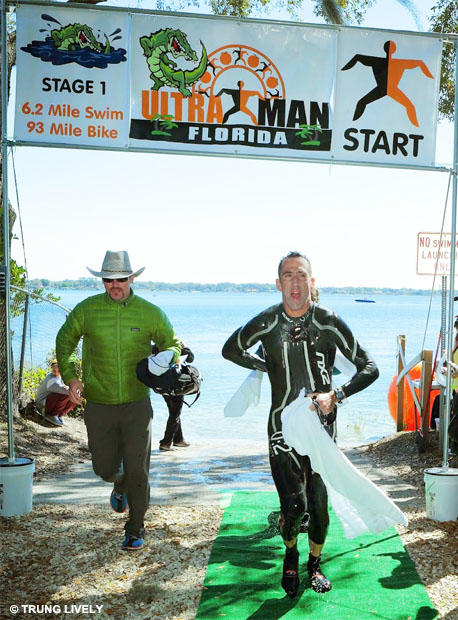
ST: What do you think about the cooperative, ohana aloha spirit at the core of this race?
Billy: Ultraman is no joke and being done so early each day gave me much more time to recover. My pre-race breakfast table-mate Randy Latza finished last, but he still got those distances done! It gets lonely out there and it is awesome to have other crews supporting you. My crew had their moments of giving back to the other athletes. I was there to race, but at the same time, I was in awe of everyone who toed the line.
ST: Tell us about Dave Orlowski – a fellow Marine – who was one of the 15 men who did the first Ironman in 1978?
Billy: I met Dave through an athlete/friend before Ironman Wisconsin in 2012 and it was awesome. I just soaked up his story of the first Ironman and I wanted to be Dave Orlowski back in 1978. Ultraman seems like something he would do – go around an island – sure!!! It is that get ‘er done, semper gumby, do-more-with-less attitude they had in that first Ironman. I love that spirit.
ST: What was it like on the Day 1 bike chasing the Brazilian who had the fastest swim?
Billy: I was a mess coming out of the water and I actually had no idea how far down I was (40 minutes). Around mile 50 (of 90), I learned I had caught back 30 minutes of his lead and I settled down. However, I still had Christian Isakson up the road. I knew if he put together a solid race he would be competitive all weekend. I rode way over my watts the first 2 hours and then backed it down the final 20 miles. I ended up riding nearly at my goal time for the day but I paced it poorly.
ST: What was Joanna Zeiger’s style in strategy and psych support?
Billy: Joanna is not inspirational or kind – she just tells me what to do. It is cut and dry – and if she is telling me to do something, I should probably do it.
ST: You really charged on Day 2 – why was it important to put your stamp on that leg early?
Billy: I did not see a need to ride 50 watts below my goal with the group, so I got in my aero bars and gradually rode to my wattage, letting my body warm up. I had some desire to have a comfortable lead going into Day 3. And I knew I could own Day 2 just based on the fact that to me 170 miles is not that long of a ride.
ST: How did you feel physically after Day 2?
Billy: I had an issue with my foot from my leg getting out of whack. I failed to hold good form and I needed to ice my foot and have Dr. D do some work on it. I also ate several dinners (large Philly cheese steak, several plates of pasta, egg frittata). I had a lower back issue going on as well that woke me up early. But Dr. D put his magic hands to work and he had me ready to race.
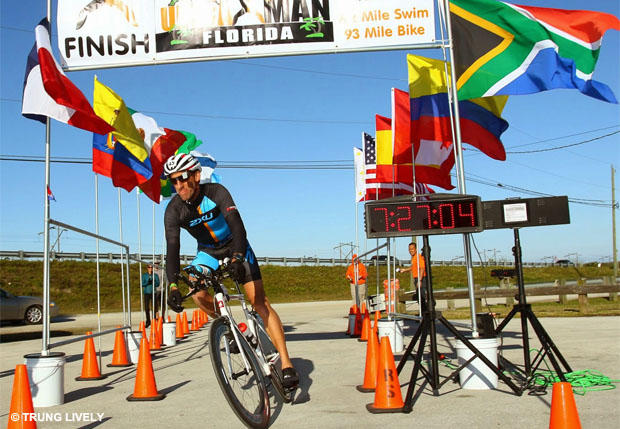
ST: How close did you get to an optimum nutrition strategy?
Billy: I was solid on Day 1 and Day 3, but on Day 2 I did not account as well for the energy deficit I had from the Day 1 cold swim and hard bike. If I had taken in more calories and avoided that bonk I might have been much faster on Day 2. JZ thinks I should eat bigger dinners. Roger that. I will gladly take that into consideration – 4 dinners instead of 3 – when I do this next time.
ST: How good of a pace runner was Joanna?
Billy: She was awesome. She also turned into a pretty good story teller. At about mile 15 of the run, she completely explained and re-wired my thinking about how I would finish the race. She smartly convinced me to just run for the win and not smash myself into any dark spots.
ST: Ultraman means long days. Some folks have hallucinations. Others are on the verge of cracking up. What about you?
Billy: I definitely have my moments of angst and can irrationally get upset if I don’t see the crew. At one point they did not catch up on the clay road section. I thought they had gotten the van stuck and started to panic – irrational! However, I never lost focus on getting it done.
ST: What did you learn about Joanna?
Billy: I learned that she is amazing at organizing and can play the support role really well. She is an Olympian (2000 Olympics 4th place) and a World Champ (2008 Ironman 70.3) but this weekend she was there for me. I was so happy how unselfish she was and helpful for me that weekend. I want to return the favor by helping her get her Olympic marathon trials qualifying time down.
ST: What did this experience mean?
Billy: The experience proved that I have the ability to do the distances comfortably and enjoy competing at the Ultraman in the future. Winning meant giving me a little platform to thank my crew and supporters (2XU and RuckPack energy shots for my entrepreneur buddy, Rob). Ultra racing is not cheap and it requires support from crewing to finances. It was my name up on the board but there were a lot of people behind that, including all the support I got via social media.
ST: What have you heard from your Naval Academy athletes?
Billy: They were stoked for me since we have trained around Clermont over the years. My only issue will be getting some speed back before spring break, so I can jump on the track from time to time to show them that I still got it and I am not this slow ultra-guy.
ST: What did your beautiful wife and delightful children think about this?
Billy: Lara was super supportive and knew I would get it done. She is my toughness inspiration – the one who has ridden her bike across the country, finished Kona with a gnarly stomach bug, done Paris-Brest-Paris in the rain, and has done several other things that make ultra racing look pathetic. I got nothing on her, that’s why I have to keep doing these races. To Paige (4) and Cooper (almost 2), I am just dad and will always be dad who bikes, swims, and runs a lot. Thankfully, they both like bikes and run around the house in their own little races.
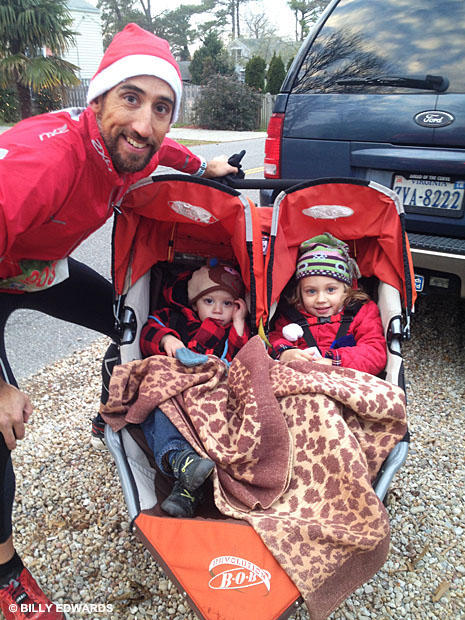
ST: Do you want to do Ultraman Hawaii?
Billy: YES! It is just a matter of what year.
ULTRAMAN CREWMEMBER – World champion Joanna Zeiger
Slowtwitch: Why did you want to serve on Billy’s support crew at Ultraman Florida?
Joanna Zeiger: I have had a strong curiosity about ultra-racing for quite some time. When Billy asked me to crew, I took this as an opportunity to not only help out a good friend, but to also get a first-hand view on how the ultra scene operates. I also regarded this as a chance to expand my knowledge about nutrition, training, and racing.
ST: What do you learn by working on an Ultraman support crew?
Joanna: I learned a tremendous amount about teamwork. Triathlon is an individual sport, but it is not possible without a strong team. We all rely on our families, friends, volunteers, and medical personnel to accomplish our goals. When it comes to ultra racing, the team is even more important. There is no on-course support, so the athletes rely on their crews for food, drink, and emotional support. Before the race, I had no idea how important the emotional support becomes as the race progresses. Just seeing a familiar face during a rough
patch can be the difference between getting through it and falling apart. I also learned about
working with people with different personalities and trying to be a cohesive unit in the face of adversity. One of our crew members got really sick with the stomach flu, and we had to make decisions quickly that we never accounted for before the race. Most importantly, we were doing something that is entirely for someone else and putting the athlete’s needs in front of everything. The weekend was really a microcosm of life and everything that I experienced has applications to anything I will do in the future.
ST: I sympathize with your struggles with an injury that has ruled out competitive triathlons. What sports can you do and what limitations does your injury place on you?
Joanna: In 2009 I crashed on my bike at the 70.3 World Championships during a faulty water bottle handoff. I broke my collar bone, which I had surgically repaired two days later, and sustained extensive damage to my rib cage that caused chronic pain and an inability to ride. I had a surgery in 2012 and hopefully my final surgery in October, 2014 to fix the remaining issues with my rib cage. During this time, I have been able to run competitively, albeit with some pain, and I continue masters swimming. The biggest limitation has been pain. The surgery in October rectified a lot of the issues, and now I am slowly regaining some strength. I hope to qualify for the 2016 Olympic marathon trials. I have not ridden a bike since 2010, but I continue to swim masters.
ST: That said, and after watching Billy up close at Ultraman, are you tempted to try it yourself?
Joanna: I have volunteered at several half and full Ironman events, and of course, I am coaching. I remain intimately involved in the sport, so any feelings of envy about being able to do triathlon disappeared long ago. While his performance was inspiring, it doesn’t personally appeal to me.
ST: What is the allure of Ultraman?
Joanna: I was hoping to find the answer to that question while I was out there, because I was wondering the same thing! People like tough challenges, and certainly, Ultraman is that. I suppose people want to find their limit and see if they can surpass it.
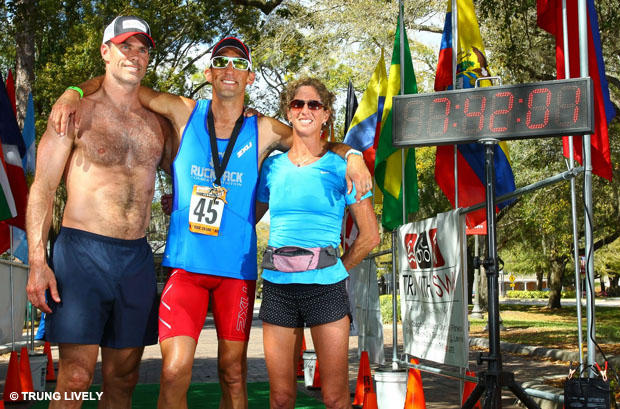
ST: Back when you were your fully healthy self, might you have been suited for Ultraman?
Joanna: Ultraman would not be a good distance for me because I have a very finicky GI system, and three straight 8-hour days of gels, bars and sports drink would put me in porta-potty hell!
ST: What did you learn serving on Billy’s support crew?
Joanna: As an athlete, I know how quickly things can go from good to horrible, and we saw that with Billy. In a very short time, he went from riding strong to looking like he was pedaling through mud. I was able to pick up on these things and troubleshoot. It is imperative for the support crew to read their athlete’s body language and listen to their tone of voice to detect any changes that indicate they need something – calories, water or electrolytes. The communication between crew and athlete needs to be constant. We had a very specific plan in place, but we had to make modifications on the fly. Flexibility is the key to any race, particularly an ultra.
ST: What was the joy in seeing Billy do well and win?
Joanna: The training for this event did not happen over the last several months, it was the culmination of many years of consistent training and racing. So it is nice to see that payoff. Being a part of his success was very rewarding.
ST: How good is he at this type of triathlon?
Joanna: Billy really seems to thrive in ultra-distance events. We learned a lot doing Ultraman Florida, and these experiences will help us get him more prepared when he does Hawaii. We shut him down on the run, so he certainly has a lot of room for improvement there, and he made a few pacing mistakes on the bike that can be rectified. We also learned a lot about his nutritional needs. With all of those things in mind, there is no doubt he can go faster.
ST: What do you think of the difference between competing on a worldwide stage at the Olympics and this small event for 35 people spread out over the Florida wilderness? What
does it say about the spirit of triathlon?
Joanna: Ultraman felt like how triathlon must have been before it became such a corporate entity. People are there because they love the sport and they want to challenge themselves. It comes totally from within. I am pleased to see that there is room in our sport for the mainstream and the fringe.


